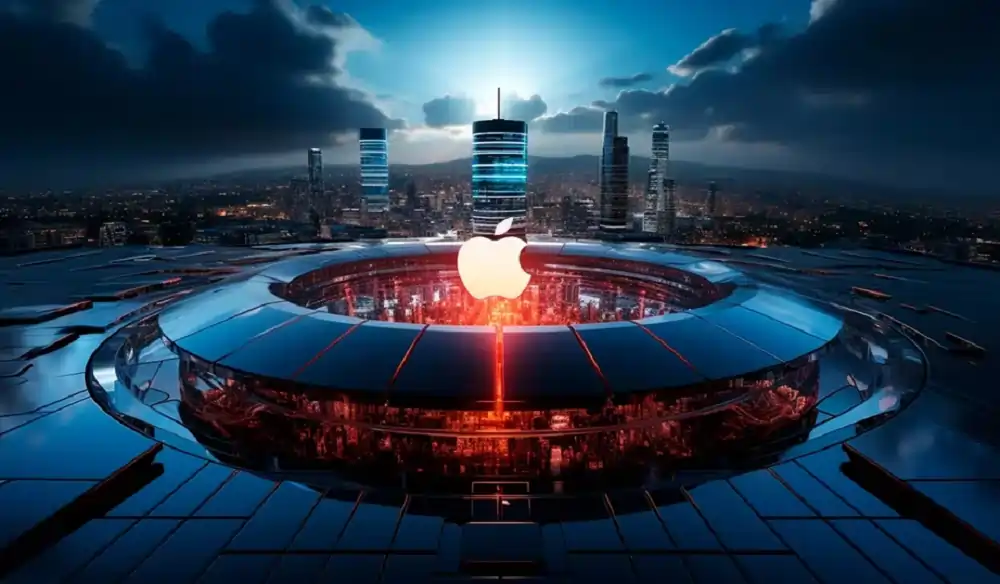Apple is quietly developing its own “Apple GPT”.
As tech giants race to launch their artificial intelligence chatbots, the Cupertino behemoth follows a secretive route, secretly honing its own innovative tools
While Google, Microsoft and other tech giants rush to launch chatbots and AI integrations in response to the ChatGPT phenomenon, Apple has been notably absent from the public battle for supremacy in this hot new field. But according to a Bloomberg report, Apple has secretly built its own AI tools and services that it refers to internally as “Apple GPT.”

This revelation briefly lifted Apple’s stock to an all-time high on Wednesday, adding more than $70 billion to its massive market valuation. It appears investors are betting that Apple could have another blockbuster technology up its sleeve, even as it avoids the very public race between companies like Google, Microsoft and OpenAI.
Bloomberg’s sources say Apple has developed an internal framework called “Ajax” to create large language models similar to those powering ChatGPT and other generative AI services. While it’s unclear if or when Apple will produce this work, AI initiatives have become a priority for several teams at the tech titan in recent months.
Given Apple’s historical dominance in consumer technology and its fervent developer community, a robust AI offering could give the company an edge over its competitors, especially if it can overcome the data privacy and content moderation challenges these tools currently face.
Siri, however, is an example to watch out for. Apple was an early pioneer in voice assistants, acquiring Siri technology in 2010. But limitations in Siri’s capabilities have since allowed Amazon’s Alexa and Google’s Assistant to surpass it in both market share and reputation.
This time, Apple seems determined not to relinquish the lead in artificial intelligence. It reportedly tried unsuccessfully in 2021 to acquire OpenAI, the startup behind ChatGPT. And while rivals are rushing to present demos to the public, Apple seems to be biding its time until its technology is more polished.
Its ultimate strategy remains unclear. Bloomberg’s sources claim that Apple has created an internal chatbot similar to a generative version of Siri. But at the moment it has no concrete plans to launch a direct competitor to ChatGPT.
Most likely, Apple will incorporate AI enhancements into its existing products and services. It could use generative techniques to improve Siri’s understanding, boost the iPhone’s new photo features, improve Apple Maps recommendations, and more. This fits with Apple’s typical approach of integrating advanced technology throughout its hardware and software ecosystem.
And, of course, there is always the possibility of Apple acquiring an AI startup once its internal efforts have matured. Apple has enormous financial resources, having generated more than $30 billion in profits in the last quarter alone. If the right opportunity arises, it has plenty of cash to instantly become a leader.
For now, Apple is coy and avoids making public statements about its big AI plans. This discretion is reminiscent of the way Apple secretly built the first iPhone and revolutionized the cell phone industry seemingly out of nowhere. Given Apple’s track record, tech giants hoping to dominate the AI race could be disrupted by the stealthy giant currently developing its own “Apple GPT” in the shadows.
In my opinion, Apple’s methodical approach of refining core AI capabilities before widespread deployment is sound. Apple’s strategy of tightly integrating AI throughout its ecosystem could ultimately prove more valuable than deploying a single chatbot application.
It’s too early to predict whether “Apple GPT” will revolutionize consumer technology like the first iPhone. But Apple’s resources and reach give it immense potential. One thing is certain: the silent giant is seriously preparing to make its mark on the future of artificial intelligence.
What effect could Apple GPT have on the artificial intelligence industry?
- It would accelerate the mass adoption of chatbots and generative AI among consumers, given the enormous reach of Apple’s products. If Apple integrates it into Siri and its apps, millions would easily access this technology.
- It would force other tech giants to redouble their efforts and accelerate their plans in generative AI so as not to be left behind. It would encourage more innovation.
- It could help “normalize” conversational AI as Apple incorporates it with its brand image focused on privacy and ease of use.
- If Apple manages to differentiate itself by offering a more privacy-focused chatbot, it could set an industry standard.
- Apple would attract more AI talent by validating this technology with a strong bet. It would drive investment in research.
- It could use its hardware expertise to develop chips optimized for natural language models.
What has Apple’s track record been like in terms of technological innovation?
- In the 1970s and 1980s, Apple revolutionized personal computers with innovative products such as the Apple II, Macintosh and mouse. They established Apple as a pioneer.
- In 2001, Apple struck a blow with the iPod and iTunes Store, dominating digital music.
- In 2007, the iPhone transformed smartphones and the mobile industry, with its innovative design and use of mobile data.
- The iPad in 2010 popularized tablets and created a new category of devices.
- More recently, Apple’s focus on privacy, artificial intelligence and augmented reality shows its commitment to emerging technologies.
- Apple’s design and vertical integration of hardware and software allow it to build highly innovative, trend-setting products.
- However, Apple has had failures such as the Apple Newton. And critics point out that it has lost innovative leadership since the days of Steve Jobs.
But its closed, user experience-focused ecosystem has allowed it to reinvent and dominate new product categories by transforming everyday technology. Apple seeks to maintain that innovative legacy.

